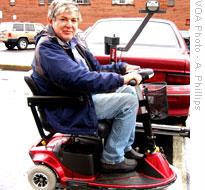The following was published in June of 2010 shortly before my mother died. It appeared in my monthly column From Where I Sit, produced on a monthly basis for Voices of Central Pennsylvania, my spiritual home here in State College, PA. The column appeared regularly for over a year, written sometimes between hospitalizations but submitted on time […]
Wheelchair Getaways
My mother Dr. Miriam P. Schmerler
Eulogy for my mother Dr. Miriam P. Schmerler Monday, September 6, 2010, State College, PA “People do not wish to learn about how to deal with death until they are confronted by death, and when they are confronted with death they are not inclined to study how religion approaches it,” writes Maurice Lamm in […]
Goodbye car, you served me well
Here I am sitting at the wheel chair lift at the rear of my 1993 Buick which died this month at State College PA and is, as I write, now a paperweight-like compressed object already sold by the wrecking car company that bought the car. The odometer reading at the car’s death was 160,084 miles. […]
Travel barriers limit lives of those with disabilities
The following is my June, 2010 column From Where I Sit for Voices of Central Pennsylvania: “Are you really my son?” my 84-year-old mother, who suffers from dementia, asks. Six weeks ago my mother, Dr. Miriam Pell Schmerler, stopped answering the telephone by herself. Our weekly calls were models of the bizarre, with my combining […]


